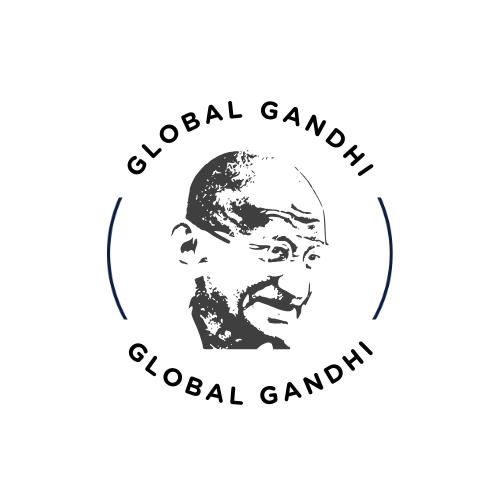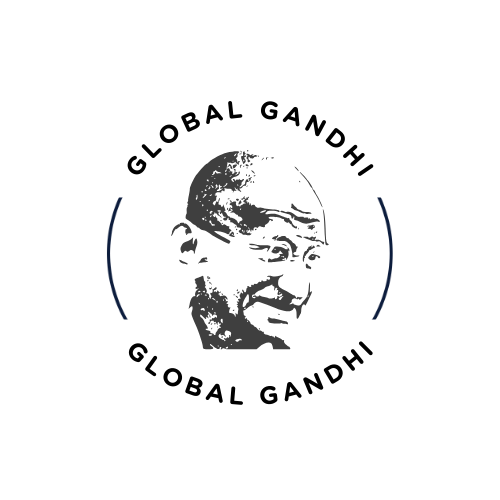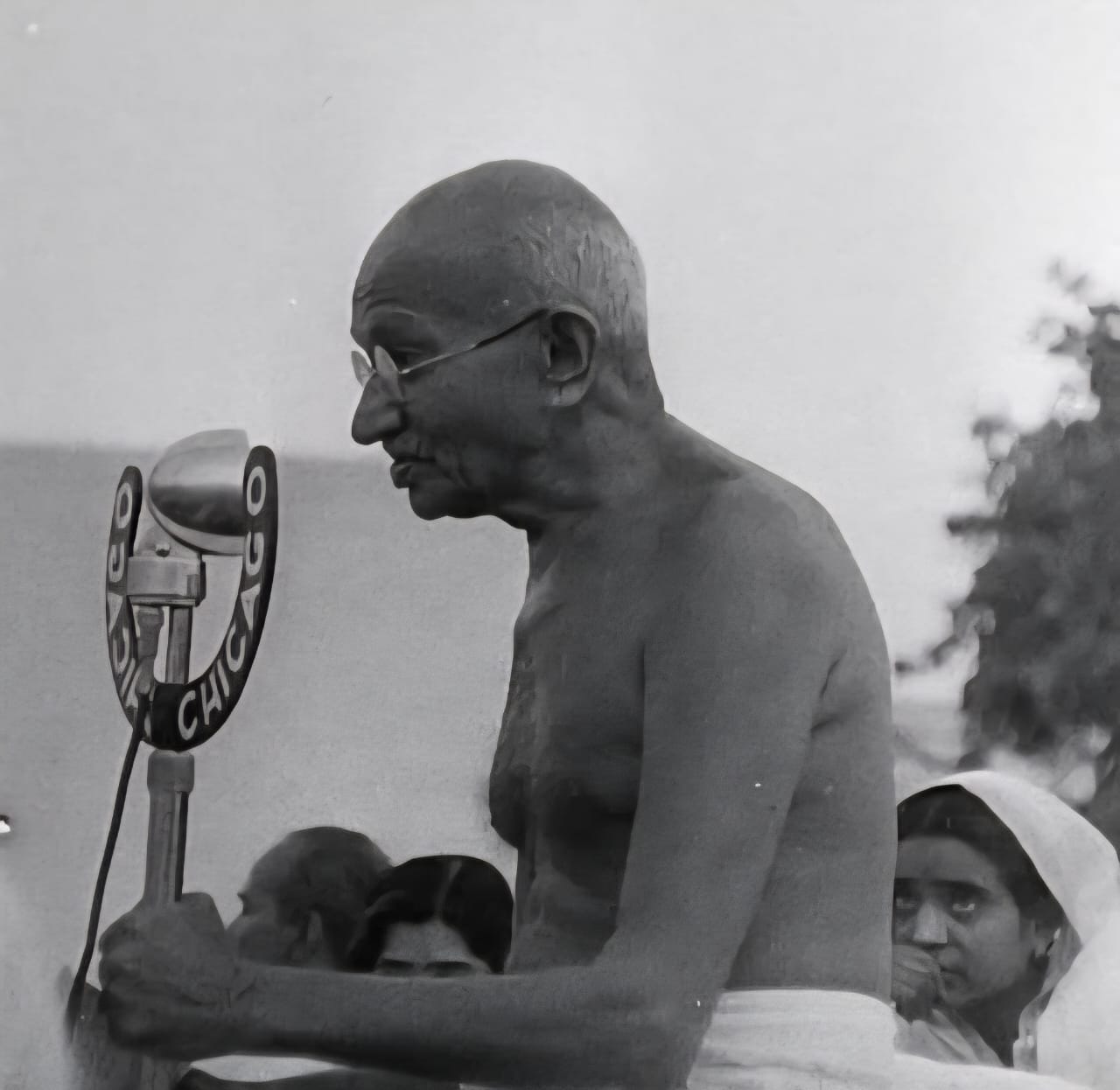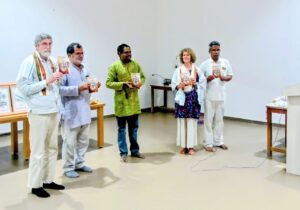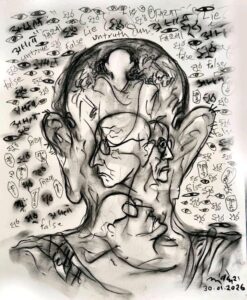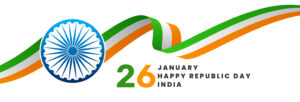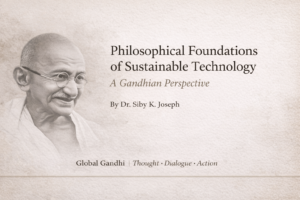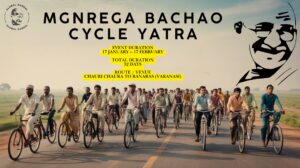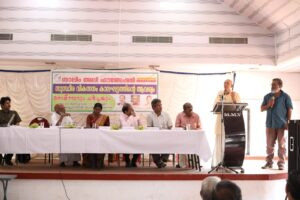Mahatma Gandhi was perhaps the only world leader who reflected on almost every aspect of human life, from religion to politics. He possessed an uncanny ability to utilize every occasion as a platform to articulate his perspectives. He adeptly used even religious festivals and metaphors to convey his vision of an ideal society. Tailoring his message to a particular audience, he used metaphors like the Kingdom of God and Ramarajya to encapsulate his idealistic vision of a just and equitable society.He skillfully utilized various Hindu religious festivals, to convey his ideals and objectives. What is significant is that in that process he offered a nuanced interpretation of these festivals, diverging from traditional perspectives. Infact , Gandhi reinterpreted festivals like Vijayadashami and Diwalii, infusing them with new meanings that aligned with his vision of a more compassionate and equitable society which he was pursuing. By reimagining these festivals, Gandhi aimed to promote values of friendship, communal amity, unity among different religious traditions and service to humanity.Through his reinterpretation of Hindu festivals, Gandhi sought to create a more inclusive and progressive understanding of Hindu religion, one that transcended narrow sectarian boundaries and fostered a sense of shared humanity.
These are Diwali days, let us look how Gandhi looked upon the very festival, how to celebrate it and what would be our duty in a particular context . Gandhi in an article published in Navajivan on October 31, 1920 discussed the question how to celebrate Diwali? He used the upcoming festival as an opportunity to link his concept of swaraj with Ramarajya .He stated that in British rule we have no right to celebrate Diwali because it is not Ramarajya. He said “It would be no exaggeration to say that in this kaliyuga we have no right to celebrate Diwali with so much jubilation. Our celebrating Diwali implies that we feel we are living in Ramarajya. Do we have Ramarajya in India today?”
Gandhi further explains the reasons for not celebrating Diwali. “A king who is not prepared to listen to his subjects, under whose rule the subjects get no milk to drink, no food to eat and no cloth to wear, a king who massacres his innocent subjects, who trades in wine, hemp and opium, who, by eating pork, hurts the feelings of Muslims and, by eating beef, the feelings of Hindus, who threatens the very existence of Islam and gambles at horse-racing — how can the subjects of such a king celebrate Diwali?”
Gandhi looked upon the British rule as Ravanarajya and the government he dreamt as Ramarajya . He equated Ramarajya with his concept of Swaraj . “Swaraj alone can be such Ramarajya” He deliberated on how we establish it? The answer before him was nothing but Non co-operation.”In former times, the subjects did tapascharya when they were oppressed. They believed that it was because of their sins that they got a wicked king and so they tried to purify themselves. The first step in this was to recognize a monster as such and avoid him, to non-cooperate with him. Even non-cooperation requires courage. To cultivate it, one needs to give up comforts and pleasures. To receive education provided by a wicked Government, to accept honours at its hands, to seek settlement of one’s disputes through its agency, to help it in framing laws, to provide it with policemen, to wear cloth produced by it, to do this while desiring that it should perish is like trying to cut off the branch on which one is sitting.” He concluded it by stating that at any rate, we should not do the following during Diwali: (i)Treat ourselves to pleasures,(ii) gamble,(iii) Prepare all manner of sweet dishes, and (iv) Enjoy ourselves with fire-works.He called upon the people to donate the money saved by renouncing these things for true Swaraj work.He considered it as the duty dictated by these difficult times and we can have no celebrations on the eve of Diwali. Gandhi was of the view that ” when we have the Government of our dream, we may enjoy some innocent pleasures.”
When Non-Cooperation was in full swing , he wrote in Navajivan again on November 7, 1920 ” The Diwali festival stands for the end of the demon’s rule and the establishment of Ramarajya. It is my humble view that, so long as our country is in slavery, we cannot celebrate Diwali with all manner of things to enjoy. The best way to celebrate Diwali is to spend these days in activities which will hasten swaraj, help uphold the honour of our Muslim friends and heal a little the wounds of the Punjab. If my advice is followed, we should save something from what we would otherwise spend on celebrating Diwali. This may also help the movement considerably. I hope every man and woman will join in this holy work.”
In 1931 on the eve of Diwali Gandhi was in London, Iin his Diwali message he wrote ” True Diwali will come when Swaraj is won. Let us remember that Diwali represents the annual celebration of the victory of the forces of Rama — that is, non-violence and truth — over those of Ravana — violence and untruth. “(London, November 9, 1931) The Bombay Chronicle, 10-11-1931
Gandhi delivered a speech during a prayer meeting, on the occasion of first Diwali after independence in 1947.He explained the metaphor behind the celebration of Diwali ” Today is Diwali and I congratulate all of you on the occasion. It is a great day in the Hindu calendar. According to the Vikram Samvat, New Year begins tomorrow on Thursday. You must understand why Diwali is celebrated every year with illuminations. In the great battle between Rama and Ravana, Rama symbolized the forces of good and Ravana the forces of evil. Rama conquered Ravana and this victory established Ramarajya in India.”Gandhi was not in mood to celebrate Diwali due to the communal frenzy that prevailed in India after the Partition. He clarified “But alas! Today there is no Ramarajya in India. So how can we celebrate Diwali? Only those who have Rama within can celebrate this victory. For, God alone can illumine our souls and only that light is real light. The bhajan that was sung today emphasizes the poet’s desire to see God. Crowds of people go to see artificial illumination but what we need today is the light of love in our hearts. We must kindle the light of love within. Then only would we deserve congratulations. Today thousands are in acute distress. Can you, everyone of you, lay your hand on your heart and say that every sufferer, whether Hindu, Sikh or Muslim, is your own brother or sister? This is the test for you. Rama and Ravana are symbols of the unending struggle between the forces of good and evil. True light comes from within.”
While celebrating Diwali in the spirit of Gandhi’s ideas we should kindle the light of love within ourselves and spread it throughout the neighbourhood in which we live and humanity as whole. We should promote the spirit of communal harmony treating all individuals as your brothers and sisters irrespective of faith, economic or social background. These days are days of polarization and division and Gandhi’s thoughts on Diwali guide one and all .
About the Author
Dr. Siby K. Joseph is Director, Sri Jamnalal Bajaj Memorial Library and Research Centre for Gandhian Studies,
Sevagram Ashram Pratishthan, Sevagram,Wardha- 442102, Maharashtra (INDIA)
Email: directorjbmlrc@gmail.com
Celebrating Diwali with Gandhi : Kindling the light of love and Harmony
Siby Kollappallil joseph
Mahatma Gandhi was perhaps the only world leader who reflected on almost every aspect of human life, from religion to politics. He possessed an uncanny ability to utilize every occasion as a platform to articulate his perspectives. He adeptly used even religious festivals and metaphors to convey his vision of an ideal society. Tailoring his message to a particular audience, he used metaphors like the Kingdom of God and Ramarajya to encapsulate his idealistic vision of a just and equitable society.He skillfully utilized various Hindu religious festivals, to convey his ideals and objectives. What is significant is that in that process he offered a nuanced interpretation of these festivals, diverging from traditional perspectives. Infact , Gandhi reinterpreted festivals like Vijayadashami and Diwalii, infusing them with new meanings that aligned with his vision of a more compassionate and equitable society which he was pursuing. By reimagining these festivals, Gandhi aimed to promote values of friendship, communal amity, unity among different religious traditions and service to humanity.Through his reinterpretation of Hindu festivals, Gandhi sought to create a more inclusive and progressive understanding of Hindu religion, one that transcended narrow sectarian boundaries and fostered a sense of shared humanity.
These are Diwali days, let us look how Gandhi looked upon the very festival, how to celebrate it and what would be our duty in a particular context . Gandhi in an article published in Navajivan on October 31, 1920 discussed the question how to celebrate Diwali? He used the upcoming festival as an opportunity to link his concept of swaraj with Ramarajya .He stated that in British rule we have no right to celebrate Diwali because it is not Ramarajya. He said “It would be no exaggeration to say that in this kaliyuga we have no right to celebrate Diwali with so much jubilation. Our celebrating Diwali implies that we feel we are living in Ramarajya. Do we have Ramarajya in India today?”
Gandhi further explains the reasons for not celebrating Diwali. “A king who is not prepared to listen to his subjects, under whose rule the subjects get no milk to drink, no food to eat and no cloth to wear, a king who massacres his innocent subjects, who trades in wine, hemp and opium, who, by eating pork, hurts the feelings of Muslims and, by eating beef, the feelings of Hindus, who threatens the very existence of Islam and gambles at horse-racing — how can the subjects of such a king celebrate Diwali?”
Gandhi looked upon the British rule as Ravanarajya and the government he dreamt as Ramarajya . He equated Ramarajya with his concept of Swaraj . “Swaraj alone can be such Ramarajya” He deliberated on how we establish it? The answer before him was nothing but Non co-operation.”In former times, the subjects did tapascharya when they were oppressed. They believed that it was because of their sins that they got a wicked king and so they tried to purify themselves. The first step in this was to recognize a monster as such and avoid him, to non-cooperate with him. Even non-cooperation requires courage. To cultivate it, one needs to give up comforts and pleasures. To receive education provided by a wicked Government, to accept honours at its hands, to seek settlement of one’s disputes through its agency, to help it in framing laws, to provide it with policemen, to wear cloth produced by it, to do this while desiring that it should perish is like trying to cut off the branch on which one is sitting.” He concluded it by stating that at any rate, we should not do the following during Diwali: (i)Treat ourselves to pleasures,(ii) gamble,(iii) Prepare all manner of sweet dishes, and (iv) Enjoy ourselves with fire-works.He called upon the people to donate the money saved by renouncing these things for true Swaraj work.He considered it as the duty dictated by these difficult times and we can have no celebrations on the eve of Diwali. Gandhi was of the view that ” when we have the Government of our dream, we may enjoy some innocent pleasures.”
When Non-Cooperation was in full swing , he wrote in Navajivan again on November 7, 1920 ” The Diwali festival stands for the end of the demon’s rule and the establishment of Ramarajya. It is my humble view that, so long as our country is in slavery, we cannot celebrate Diwali with all manner of things to enjoy. The best way to celebrate Diwali is to spend these days in activities which will hasten swaraj, help uphold the honour of our Muslim friends and heal a little the wounds of the Punjab. If my advice is followed, we should save something from what we would otherwise spend on celebrating Diwali. This may also help the movement considerably. I hope every man and woman will join in this holy work.”
In 1931 on the eve of Diwali Gandhi was in London, Iin his Diwali message he wrote ” True Diwali will come when Swaraj is won. Let us remember that Diwali represents the annual celebration of the victory of the forces of Rama — that is, non-violence and truth — over those of Ravana — violence and untruth. “(London, November 9, 1931) The Bombay Chronicle, 10-11-1931
Gandhi delivered a speech during a prayer meeting, on the occasion of first Diwali after independence in 1947.He explained the metaphor behind the celebration of Diwali ” Today is Diwali and I congratulate all of you on the occasion. It is a great day in the Hindu calendar. According to the Vikram Samvat, New Year begins tomorrow on Thursday. You must understand why Diwali is celebrated every year with illuminations. In the great battle between Rama and Ravana, Rama symbolized the forces of good and Ravana the forces of evil. Rama conquered Ravana and this victory established Ramarajya in India.”Gandhi was not in mood to celebrate Diwali due to the communal frenzy that prevailed in India after the Partition. He clarified “But alas! Today there is no Ramarajya in India. So how can we celebrate Diwali? Only those who have Rama within can celebrate this victory. For, God alone can illumine our souls and only that light is real light. The bhajan that was sung today emphasizes the poet’s desire to see God. Crowds of people go to see artificial illumination but what we need today is the light of love in our hearts. We must kindle the light of love within. Then only would we deserve congratulations. Today thousands are in acute distress. Can you, everyone of you, lay your hand on your heart and say that every sufferer, whether Hindu, Sikh or Muslim, is your own brother or sister? This is the test for you. Rama and Ravana are symbols of the unending struggle between the forces of good and evil. True light comes from within.”
While celebrating Diwali in the spirit of Gandhi’s ideas we should kindle the light of love within ourselves and spread it throughout the neighbourhood in which we live and humanity as whole. We should promote the spirit of communal harmony treating all individuals as your brothers and sisters irrespective of faith, economic or social background. These days are days of polarization and division and Gandhi’s thoughts on Diwali guide one and all .
About the Author
Dr. Siby K. Joseph is Director, Sri Jamnalal Bajaj Memorial Library and Research Centre for Gandhian Studies,
Sevagram Ashram Pratishthan, Sevagram,Wardha- 442102, Maharashtra (INDIA)
Email: directorjbmlrc@gmail.com
